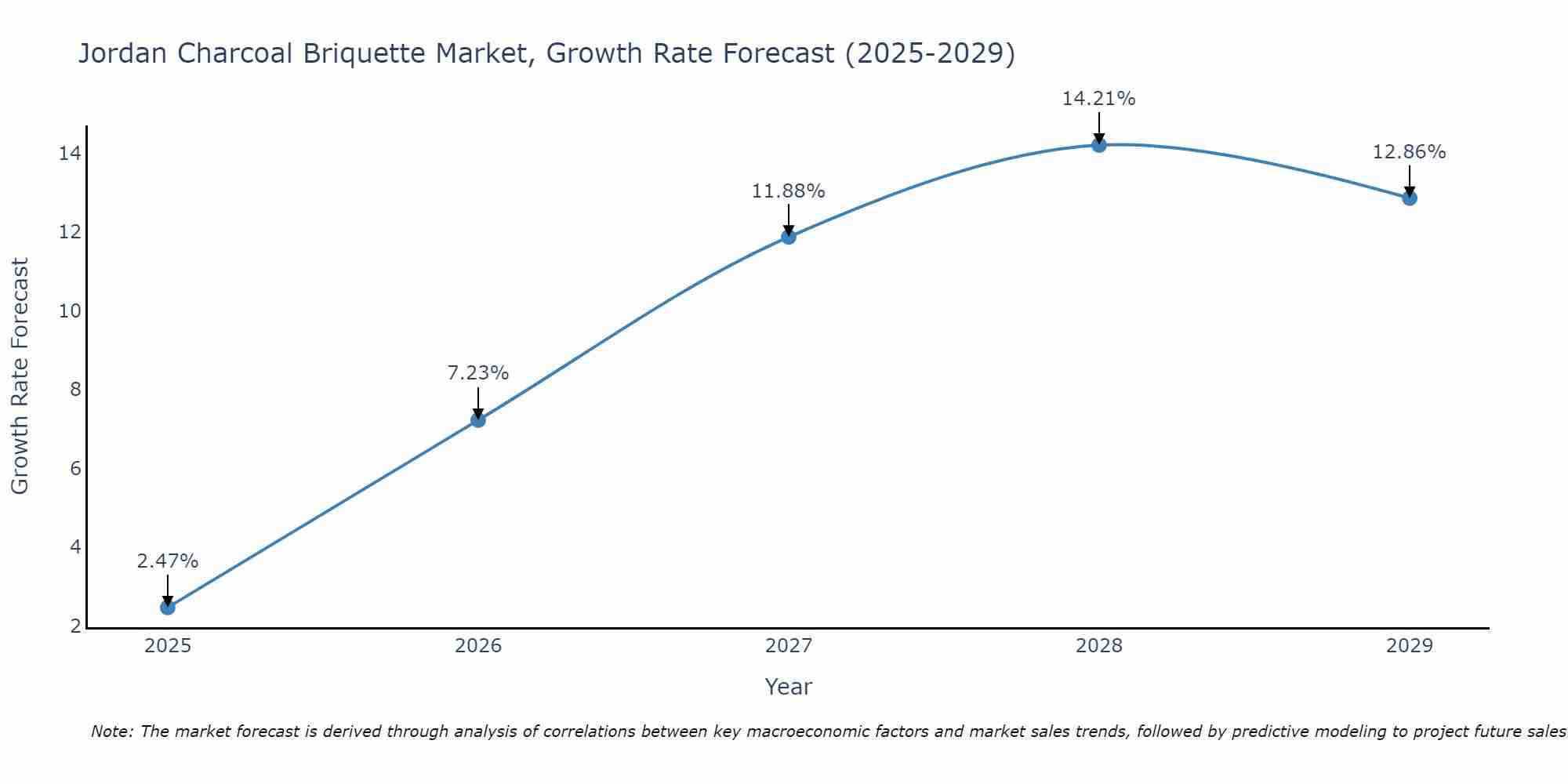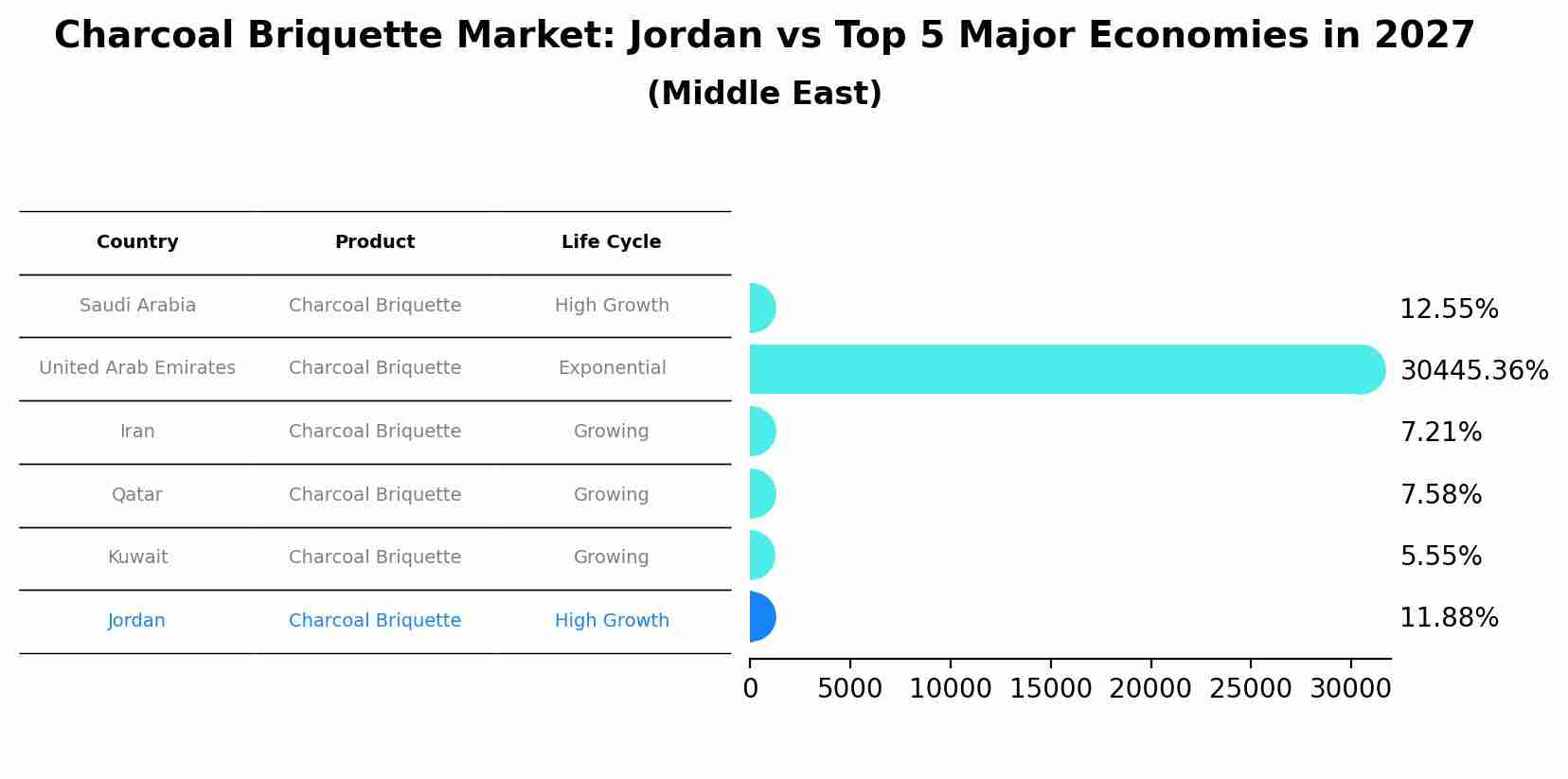Jordan Charcoal Briquette Market (2025-2031) Outlook | Industry, Companies, Forecast, Value, Growth, Share, Revenue, Analysis, Trends & Size
| Product Code: ETC286546 | Publication Date: Aug 2022 | Updated Date: Jul 2025 | Product Type: Market Research Report | |
| Publisher: 6Wresearch | Author: Dhaval Chaurasia | No. of Pages: 75 | No. of Figures: 35 | No. of Tables: 20 |
Jordan Charcoal Briquette Market Size Growth Rate
The Jordan Charcoal Briquette Market is projected to witness mixed growth rate patterns during 2025 to 2029. Growth accelerates to 14.21% in 2028, following an initial rate of 2.47%, before easing to 12.86% at the end of the period.

Charcoal Briquette Market: Jordan vs Top 5 Major Economies in 2027 (Middle East)
The Charcoal Briquette market in Jordan is projected to grow at a high growth rate of 11.88% by 2027, highlighting the country's increasing focus on advanced technologies within the Middle East region, where Saudi Arabia holds the dominant position, followed closely by United Arab Emirates, Iran, Qatar and Kuwait, shaping overall regional demand.

Jordan Charcoal Briquette Market Overview
The Jordan charcoal briquette market is experiencing steady growth due to the increasing popularity of grilling and barbecuing activities among consumers. The market is driven by the convenience and efficiency of charcoal briquettes compared to traditional charcoal or wood. Jordan`s stable economy and rising disposable income levels contribute to the demand for high-quality charcoal briquettes. Additionally, the growing awareness of environmental sustainability and the benefits of using charcoal briquettes sourced from sustainable materials further propel market growth. Key players in the Jordan charcoal briquette market are focusing on product innovation, eco-friendly manufacturing processes, and expanding distribution channels to meet the evolving consumer preferences and maintain a competitive edge in the market.
Jordan Charcoal Briquette Market Trends
The Jordan charcoal briquette market is experiencing a growing demand for sustainable and eco-friendly products as consumers increasingly prioritize environmental consciousness. There is a shift towards using charcoal briquettes made from renewable sources such as coconut shells or bamboo, as opposed to traditional charcoal derived from wood. This trend is driven by concerns over deforestation and air pollution, as well as a preference for cleaner and longer-lasting fuel options for grilling and cooking. Manufacturers are focusing on promoting the benefits of these alternative charcoal briquettes, including higher heat efficiency, lower smoke emissions, and reduced environmental impact. Additionally, innovative packaging designs and marketing strategies highlighting the sustainable attributes of charcoal briquettes are gaining traction among consumers in Jordan.
Jordan Charcoal Briquette Market Challenges
In the Jordan Charcoal Briquette Market, challenges include competition from alternative fuel sources such as gas and electricity, which are perceived as more convenient and cleaner options. Additionally, the fluctuating prices of raw materials like wood and coconut shells used in briquette production impact the overall cost and profitability of the market. Consumer awareness and education about the environmental benefits of using charcoal briquettes over traditional charcoal are also key challenges, as many consumers may not be well-informed about the differences in terms of sustainability and efficiency. Distribution and logistics issues, such as transportation costs and supply chain management, further hinder the growth of the market. Overall, overcoming these challenges requires strategic marketing efforts, product innovation, and a focus on sustainability to drive demand and establish a competitive edge in the Jordan Charcoal Briquette Market.
Jordan Charcoal Briquette Market Investment Opportunities
The Jordan charcoal briquette market presents promising investment opportunities due to the increasing demand for eco-friendly and sustainable fuel alternatives. With a growing awareness of environmental issues and a shift towards cleaner energy sources, there is a rising interest in charcoal briquettes as a renewable and efficient fuel option. Investing in the production and distribution of high-quality charcoal briquettes in Jordan can cater to both domestic and potentially export markets. Additionally, advancements in technology and production processes present opportunities for innovation and differentiation within the market. Partnering with local suppliers of raw materials such as biomass waste and establishing a strong distribution network can further enhance the growth potential in the Jordan charcoal briquette market.
Jordan Charcoal Briquette Market Government Policy
The Jordanian government has implemented policies to regulate the charcoal briquette market, aiming to promote sustainable practices and protect the environment. These policies include setting standards for production to ensure the use of sustainable resources and limiting deforestation. Additionally, the government has imposed regulations on the import and export of charcoal briquettes to control the market and prevent illegal practices. Furthermore, there are initiatives to support local producers and promote the use of alternative fuels to reduce dependence on charcoal. Overall, the government`s policies in the Jordan charcoal briquette market focus on sustainability, environmental protection, and supporting local industries while also addressing the potential negative impacts of the industry on the environment.
Jordan Charcoal Briquette Market Future Outlook
The future outlook for the Jordan Charcoal Briquette Market appears promising, driven by the growing demand for eco-friendly and sustainable cooking fuel alternatives. As consumers become more environmentally conscious and seek cleaner energy sources, charcoal briquettes are expected to gain traction due to their lower emissions and longer burning times compared to traditional charcoal. Additionally, the convenience and affordability of charcoal briquettes make them an attractive option for households and businesses alike. With a focus on sustainability and increasing awareness about the environmental impact of traditional charcoal production, the market is likely to witness steady growth in the coming years. However, factors such as raw material availability, pricing pressures, and competition from alternative fuels may influence market dynamics and require continuous innovation and marketing strategies to maintain market share and capitalize on emerging opportunities.
Key Highlights of the Report:
- Jordan Charcoal Briquette Market Outlook
- Market Size of Jordan Charcoal Briquette Market, 2024
- Forecast of Jordan Charcoal Briquette Market, 2031
- Historical Data and Forecast of Jordan Charcoal Briquette Revenues & Volume for the Period 2021 - 2031
- Jordan Charcoal Briquette Market Trend Evolution
- Jordan Charcoal Briquette Market Drivers and Challenges
- Jordan Charcoal Briquette Price Trends
- Jordan Charcoal Briquette Porter's Five Forces
- Jordan Charcoal Briquette Industry Life Cycle
- Historical Data and Forecast of Jordan Charcoal Briquette Market Revenues & Volume By Type for the Period 2021 - 2031
- Historical Data and Forecast of Jordan Charcoal Briquette Market Revenues & Volume By Wood Type for the Period 2021 - 2031
- Historical Data and Forecast of Jordan Charcoal Briquette Market Revenues & Volume By Others for the Period 2021 - 2031
- Historical Data and Forecast of Jordan Charcoal Briquette Market Revenues & Volume By Application for the Period 2021 - 2031
- Historical Data and Forecast of Jordan Charcoal Briquette Market Revenues & Volume By Metallurgical Industry for the Period 2021 - 2031
- Historical Data and Forecast of Jordan Charcoal Briquette Market Revenues & Volume By BBQ for the Period 2021 - 2031
- Historical Data and Forecast of Jordan Charcoal Briquette Market Revenues & Volume By Others for the Period 2021 - 2031
- Jordan Charcoal Briquette Import Export Trade Statistics
- Market Opportunity Assessment By Type
- Market Opportunity Assessment By Application
- Jordan Charcoal Briquette Top Companies Market Share
- Jordan Charcoal Briquette Competitive Benchmarking By Technical and Operational Parameters
- Jordan Charcoal Briquette Company Profiles
- Jordan Charcoal Briquette Key Strategic Recommendations
Frequently Asked Questions About the Market Study (FAQs):
- Single User License$ 1,995
- Department License$ 2,400
- Site License$ 3,120
- Global License$ 3,795
Search
Thought Leadership and Analyst Meet
Our Clients
Related Reports
- Canada Oil and Gas Market (2026-2032) | Share, Segmentation, Value, Industry, Trends, Forecast, Analysis, Size & Revenue, Growth, Competitive Landscape, Outlook, Companies
- Germany Breakfast Food Market (2026-2032) | Industry, Share, Growth, Size, Companies, Value, Analysis, Revenue, Trends, Forecast & Outlook
- Australia Briquette Market (2025-2031) | Growth, Size, Revenue, Forecast, Analysis, Trends, Value, Share, Industry & Companies
- Vietnam System Integrator Market (2025-2031) | Size, Companies, Analysis, Industry, Value, Forecast, Growth, Trends, Revenue & Share
- ASEAN and Thailand Brain Health Supplements Market (2025-2031) | Strategy, Consumer Insights, Analysis, Investment Trends, Opportunities, Growth, Size, Share, Industry, Revenue, Segments, Value, Segmentation, Supply, Forecast, Restraints, Outlook, Competition, Drivers, Trends, Demand, Pricing Analysis, Competitive, Strategic Insights, Companies, Challenges
- ASEAN Bearings Market (2025-2031) | Strategy, Consumer Insights, Analysis, Investment Trends, Opportunities, Growth, Size, Share, Industry, Revenue, Segments, Value, Segmentation, Supply, Forecast, Restraints, Outlook, Competition, Drivers, Trends, Demand, Pricing Analysis, Competitive, Strategic Insights, Companies, Challenges
- Europe Flooring Market (2025-2031) | Outlook, Share, Industry, Trends, Forecast, Companies, Revenue, Size, Analysis, Growth & Value
- Saudi Arabia Manlift Market (2025-2031) | Outlook, Size, Growth, Trends, Companies, Industry, Revenue, Value, Share, Forecast & Analysis
- Uganda Excavator, Crane, and Wheel Loaders Market (2025-2031) | Strategy, Consumer Insights, Analysis, Investment Trends, Opportunities, Growth, Size, Share, Industry, Revenue, Segments, Value, Segmentation, Supply, Forecast, Restraints, Outlook, Competition, Drivers, Trends, Demand, Pricing Analysis, Competitive, Strategic Insights, Companies, Challenges
- Rwanda Excavator, Crane, and Wheel Loaders Market (2025-2031) | Strategy, Consumer Insights, Analysis, Investment Trends, Opportunities, Growth, Size, Share, Industry, Revenue, Segments, Value, Segmentation, Supply, Forecast, Restraints, Outlook, Competition, Drivers, Trends, Demand, Pricing Analysis, Competitive, Strategic Insights, Companies, Challenges
Industry Events and Analyst Meet
Whitepaper
- Middle East & Africa Commercial Security Market Click here to view more.
- Middle East & Africa Fire Safety Systems & Equipment Market Click here to view more.
- GCC Drone Market Click here to view more.
- Middle East Lighting Fixture Market Click here to view more.
- GCC Physical & Perimeter Security Market Click here to view more.
6WResearch In News
- Doha a strategic location for EV manufacturing hub: IPA Qatar
- Demand for luxury TVs surging in the GCC, says Samsung
- Empowering Growth: The Thriving Journey of Bangladesh’s Cable Industry
- Demand for luxury TVs surging in the GCC, says Samsung
- Video call with a traditional healer? Once unthinkable, it’s now common in South Africa
- Intelligent Buildings To Smooth GCC’s Path To Net Zero


















